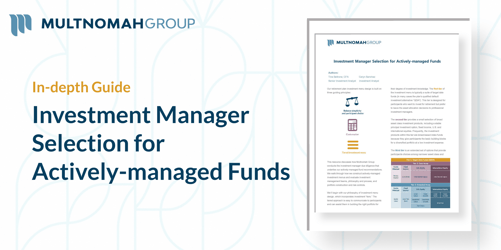So far in this series, we've covered our three guiding priciples to investment menu design and what we look for within an investment team's structure. As we continue this series focused on investment manager selection for actively-managed funds, we will share our review of an investment manager's philosophy and process.
Philosophy and Process
With thousands of investment product offerings within the actively-managed fund space, how do we successfully identify attractive funds within each asset class? The process begins with an initial screening to narrow the universe to a manageable list of strategies that have previously demonstrated consistency in performance and execution based on various metrics. From there, the hard work begins. We spend most of our time reviewing qualitative aspects of investment strategies including the philosophy and process of each fund that screens well within its asset class. So, what exactly are we looking for in philosophy and process to cause us to recommend a fund?
Our firm believes investment strategies must have well thought out and clearly defined investment philosophies and processes. The process must be repeatable. If the Portfolio Manager (PM) is committed to the process and avoids wandering between styles based on market movements, this is the best way to ensure that returns are repeatable and predictable. For our firm to have conviction in a strategy’s philosophy and process, we must also feel strongly about the entire investment team and its parent organization. We look for successful and tenured PM teams with strong research efforts drawing on resources from dedicated and/or centralized analyst teams, with astute traders. We prefer that teams have fewer administrative distractions, so they are able to stay focused on their respective fund’s success and are willing to learn from past mistakes.
Every investment manager believes they have a differentiated approach that helps them stand above their peers. At Multnomah Group, we seek to understand each investment manager’s unique philosophy. Some managers pursue distinct characteristics inherent in the asset class they cover, such as a large-cap value manager who concentrates on dividend-paying companies because the PM believes dividends are a signal of fiscal discipline and may dampen portfolio volatility over the long term.
Our goal is to understand these nuances and determine if the process is attractive and sound.
To arrive at this decision, we analyze quarterly presentation decks, fund commentary and attribution, and other documents from the investment manager. We also read independent fund research from third party providers to ascertain their perspective (even though we may disagree with their viewpoint). We then complete a due diligence meeting with the manager if the fund appears interesting and meets our standards.
The purpose of the due diligence interview is to determine the team’s depth, discipline, passion, skill level, and organizational structure. We drill management on the key points of the investment process mentioned above to determine how sound their methodology is to determine our confidence in the team’s ability to add-value in the future. We inquire about their holdings to ensure that they align with the fund’s investment philosophy.
By digging deeper, we seek to identify funds that can successfully rely on strong qualitative and/or quantitative analysis to pick securities that will outperform the market, while staying within the boundaries of fund’s investment guidelines. We acknowledge that investment styles can temporarily go out-of-favor, so we need to develop an understanding of how a fund’s process and philosophy can influence performance at different points of the market cycle or under different investment sentiment regimes.

Our next blog in this series will focus on what we are looking for in the investment manager's portfolio construction and risk management. If you're interested in reading our guide focused on this topic written by our senior investment analyst, Tina Beltrone, and our investment analyst, Caryn Sanchez, please click here.
Multnomah Group is a registered investment adviser, registered with the Securities and Exchange Commission. Any information contained herein or on Multnomah Group’s website is provided for educational purposes only and does not intend to make an offer or solicitation for the sale or purchase of any specific securities, investments, or investment strategies. Investments involve risk and, unless otherwise stated, are not guaranteed. Multnomah Group does not provide legal or tax advice.

